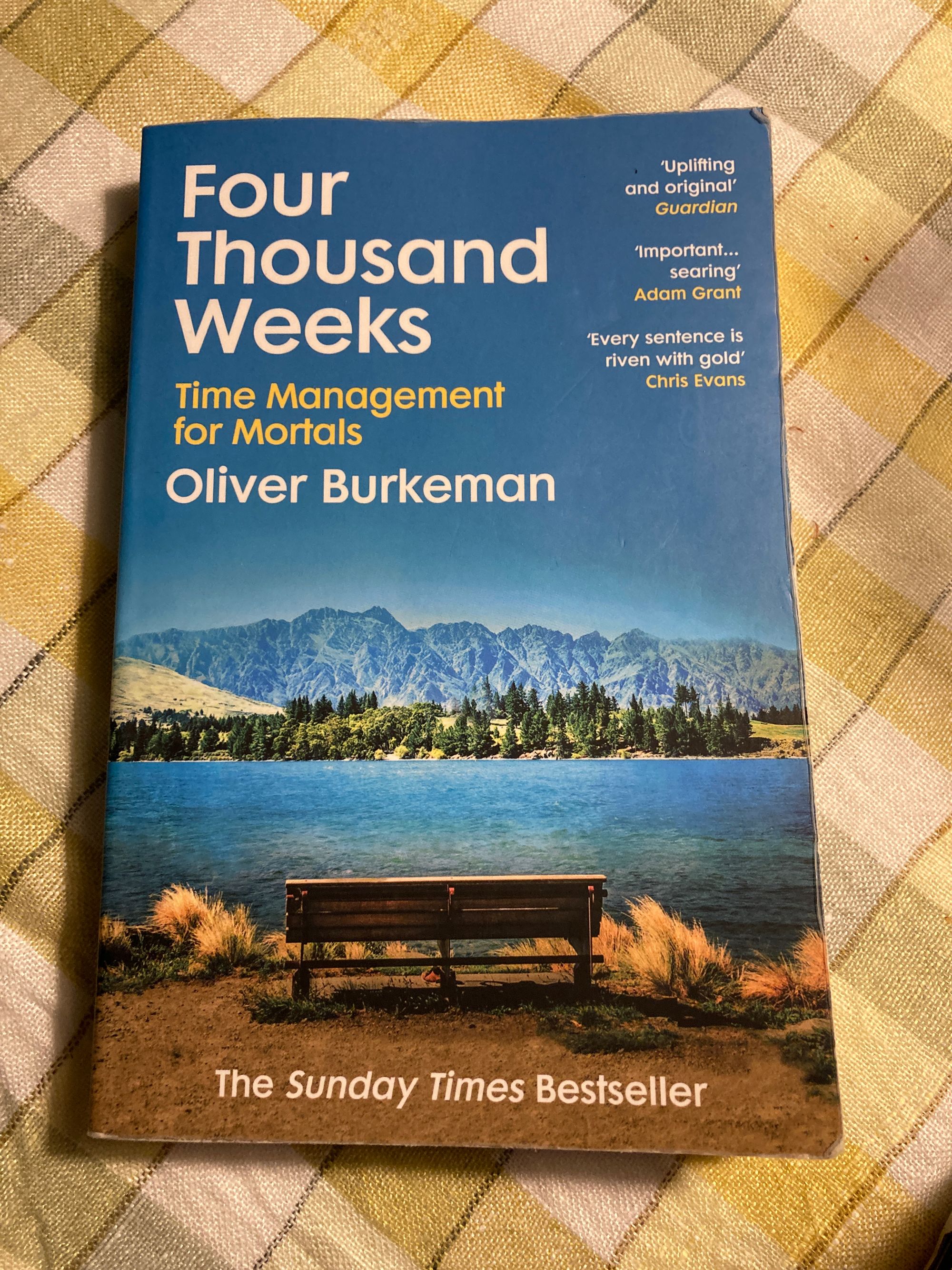Four Thousand Weeks (Oliver Burkeman) - Book Summary & Lessons

The subtitle of the book by Oliver Burkeman is "Time Management for Mortals", this captures the essence of the book well. As mortal beings time is our most valuable resource and something we should value highly. How we spend our time is important and Oliver Burkeman shows us the misconceptions and fallacies that trouble many when it comes to time management. The book gives the reader an effective way of dealing with time management and feeling better about the finitude of life.
⏳The Book in 3 Sentences
- You have enough time in life for anything, but not for everything.
- The past is uncontrollable and the future is unknowable, but life is a collection of present moments and that is what we should focus on.
- The fact that human life exists and we get to experience it is incredible, be thankful for the time we get and the marvel that is life!
🎨Impressions
Oliver Burkeman presents a fresh perspective on the world of productivity. He pulls back the hood to reveal that the fix to our productivity problems is not to optimize and find the best productivity hacks, instead, we need to reframe the problem. We will never be able to do everything we want to do, it does not matter how good your task lists are or how many Pomodoro sessions you do. There will always be things we don't have time to do. The secret is to make sure we have time to do the most important things!
Oliver Burkeman writes about a serious topic in a light tone which makes it easier to digest. Talking about the shortness of life and the fact that we will only get a certain number of weeks can lead to sad thoughts, yet he manages to thread the needle between serious and funny. I came away from the book feeling like I had learned some important life lessons and was better prepared to face life.
📖Who Should Read It?
This book contains an interesting perspective on time management and life philosophy that anyone could be interested in. I think it is especially geared towards productivity nerds like myself who may read a few too many self-help books and are continuously looking for hacks that will make them feel successful. Oliver Burkeman is a part of this tribe, having had a weekly column on productivity he understands this audience well.
This book is a celebration of life and a reminder of its finitude. It is slightly anxiety-inducing, yet insightful at the same time. It takes the premise of productivity hacks and time management tricks and presents another solution. One that does not promise you finishing a crazy number of tasks or increase your productivity tenfold, but instead lets you focus on the things that matter.
👩🏫Lessons I Have Learned
How my life / behavior / thoughts / ideas have changed as a result of reading the book.
- I am trying to be more mindful of where my time is spent. This means reflecting on what is important to you and where you want to spend your time. This is a work in progress for me.
- I am more forgiving of myself when I get distracted. There is no reason to cry over spilled milk, instead, I should accept that it will happen but try to build systems to avoid it.
- I was already aware of the finitude of life and thinking of it in weeks based on this article by Tim Urban, but this book definitely made me think about it even more.
📝Summary + Notes
Time management tools should focus on being effective and not efficient. It does not matter if we are able to finish a high volume of tasks if we choose the wrong tasks to finish. Instead, we should focus on the things that matter to us and do them well! Below you will find some of my biggest takeaways mixed with quotes from Four Thousand Weeks by Oliver Burkeman on these topics.
"The real measure of any time management technique is whether or not it helps you neglect the right things"
1. Productivity is a trap
The trap is believing that you will be able to clear out your task list and be "done". The truth is that the task list will just keep on refilling with new tasks as you finish them off. Think about when you are answering emails, the faster you answer them the more quickly they appear as people answer back to you. What we should do instead is to remove the unnecessary things from our to-do lists and focus on the essential parts.
"Becoming more efficient just makes you more rushed, and trying to clear the decks simply makes them fill up again faster"
"Acquire a reputation for doing your work at amazing speed, and you'll be given more of it"
"The real measure of any time management technique is whether or not it helps you neglect the right things"
2. Embrace "missing out" on things
We often hear about FOMO, the fear of missing out, it is the feeling of anxiety when you are missing out on an experience. I am no stranger to this feeling, but Oliver Burkeman tells us to reframe our thinking regarding missing out on things. He writes that in reality what gives experiences value is that we are choosing to miss out on other things to be there. Since we have limited time, the way we choose to spend it matters. It sounds obvious but it is a powerful insight.
"In other words, it's precisely the fact that I could have chosen a different and perhaps equally valuable way to spend this afternoon that bestows meaning on the choice I did make"
3. Focus on what you can control
Many people will go through life annoyed or agitated by things outside of their control. This is irrational as they do not have control over those things. We should instead focus on the things that we do have control over and give ourselves the best chance of succeeding. This is similar to what the stoics call the dichotomy of control, I explain more about that in my article on stoicism here.
"So, technically, it's irrational to feel troubled by an overwhelming to-do list. You'll do what you can, you won't do what you can't..."
Accepting that any choice you make will lead to a few closed doors will set you free from some of the anxiety. Even choosing inaction is making a choice so we might as well make a choice and move forward. Oliver Burkeman writes the following on the topic:
"When you can no longer turn back, anxiety falls away, because now there's only one direction to travel: forward into the consequences of your choice."
4. Live in the present
Many people forget to live in the present. They dwell on the past or worry about the future to an extent that does not allow them to enjoy the present. The truth however is that the past can't be changed and the future is unknowable therefore we should focus on living in the present moment. Because after all, life is but a collection of present moments.
"Living more fully in the present may be simply a matter of finally realising that you never had any other option but to be here now"
A common pattern that can be observed in people is how they view life experiences as stepping stones toward a future payoff. An example could be telling yourself that you should work long hours and push off that dream vacation until retirement. The problem with this way of living is that the future is not guaranteed, we are never certain about the amount of time we have. Unfortunately, we are not guaranteed a long and healthy retirement to enjoy our "dream vacations".
"Where's the logic in constantly postponing fulfillment until some later point in time when soon enough you won't have any "later" left?"
5. Life is finite and an extraordinary gift
We are all mortal and the only certainty in life is that at some point it will end. It is a fact of life, but we should not let this get us down instead we should realize how wonderful it is that we get to live! Even with this reframe it is important to keep this finitude in mind when we make life choices, the fact that we only have a certain amount of time should influence our choices.
"As you dive into life as it really is, in clear-eyed awareness of your limitations, you begin to acquire what has become the least fashionable but perhaps most consequential of superpowers: patience"
It is important to realize that we only have limited time on earth but that it can offer some benefits. Reframing how we think about this time can also be beneficial as we get to experience the wonderful experience of life.
"Why treat four thousand weeks as a very small number, because it's so tiny compared with infinity, rather than treating it as a huge number, because it's so many more weeks than if you had not been born?"
6. Seek Discomfort
Sometimes in life, we try to make everything so convenient that we may eliminate tasks that seem tedious but are truly valuable. Much of what gives things or experiences value is the struggle we put into them. Without the tediousness, we may value those moments or experiences less. Be careful so that you don't make life too convenient!
"But smoothness, it turns out, is a dubious virtue, since it's often the unsmoothed textures of life that make it liveable, helping nurture the relationships that are crucial mental and physical health, and for the resilience of our communities"
"Convenience, in other words, makes things easy, but without regard to whether easiness is truly what's most valuable in any given context"
